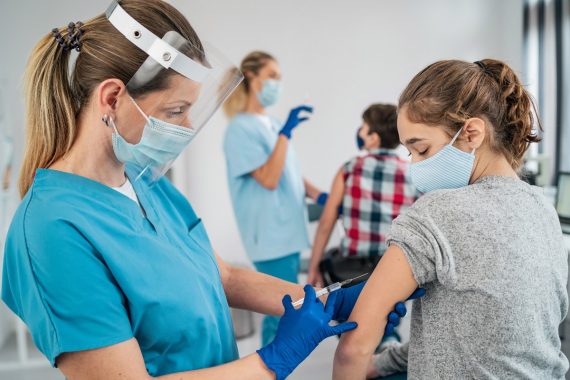GPs to identify vulnerable 12-15-year-olds for Covid vaccination

Children aged 12-15 who are deemed at ‘increased risk of serious Covid-19 disease’ should be offered the Pfizer vaccine, following new advice from the Joint Committee on Vaccination and Immunisation (JCVI).
The JCVI told Pulse it expects GPs will be asked to identify children who should have the vaccine and will need to seek consent from both the child and parent before delivering it.
Those aged 12-17 who are a household contact of someone who is immunosuppressed will also be offered vaccination to achieve ‘indirect protection’.
And all 17-year-olds will also be offered the vaccine within three months of their 18th birthday, the new guidance added.
However, the JCVI is ‘not currently advising’ routine mass vaccination for the under-18s ‘based on current evidence’ and said it would keep data on the age group ‘under review’ over the next few weeks.
Today’s guidance said children aged 12-15 who should be offered vaccinations include those with severe neurodisabilities, Down’s syndrome, immunosuppression, profound and multiple or severe learning disabilities and those who are on the learning disability register.
The health secretary said he has accepted the JCVI’s advice and asked the NHS to start vaccinating the new group ‘as soon as possible’.
Young people aged 16-17 with underlying health conditions that put them at higher risk of serious Covid should have already been offered vaccination in line with existing guidance.
Announcing the guidance, Public Health England said: ‘As evidence shows that Covid-19 rarely causes severe disease in children without underlying health conditions, at this time the JCVI’s view is that the minimal health benefits of offering universal Covid-19 vaccination to children do not outweigh the potential risks.’
It added that while real-world safety data on Covid vaccines in children is ‘limited’, there have been ‘extremely rare reports’ of myocarditis and pericarditis – inflammation of the heart muscle and membrane around the heart respectively – following the use of the Pfizer and Moderna vaccines in ‘millions of younger adults’.
‘Until more safety data is available and has been evaluated, a precautionary approach is preferred’, it said.
A formal JCVI statement added: ‘At this time, JCVI is of the view that the health benefits of universal vaccination in children and young people below the age of 18 years do not outweigh the potential risks.’
Deputy chair of the JCVI Professor Anthony Harnden said:’ The primary aim of the vaccination programme has always been to prevent hospitalisations and deaths. Based on the fact that previously well children, if they do get Covid-19, are likely to have a very mild form of the disease, the health benefits of vaccinating them are small.
‘The benefits of reducing transmission to the wider population from children are also highly uncertain, especially as vaccine uptake is very high in older people who are at highest risk from serious Covid-19 infection.’
He added that the JCVI will keep its advice ‘under review’ as more safety and effectiveness data becomes available.
Health secretary Sajid Javid said: ‘Today’s advice from the independent Joint Committee on Vaccination and Immunisation (JCVI) means more vulnerable young people at greatest risk from this virus can now benefit from Covid-19 vaccines.
‘I have accepted their expert recommendations and I have asked the NHS to prepare to vaccinate those eligible as soon as possible.’
Speaking in a background briefing attended by Pulse this afternoon, Professor Harnden said he expected NHS England would want the vaccines to be delivered through primary care and that the JCVI hoped this will be done over the next few weeks.
Responding to Pulse questioning, he added that eligible children will be best identified through primary care and that each GP practice should have small numbers on their patient list.
The new recommendation is expected to affect a relatively small number of children, estimated to be in the hundreds of thousands, but will require a detailed consent procedure involving both parent and child, he said.
Professor Harnden also said that supply considerations did not factor into the JCVI’s decision and that the Committee will not consider vaccination in the under-12s until a vaccine is approved by the MHRA for the group.
The JCVI’s formal statement added that clinical trials are underway in pre-school and primary-school-aged children but that vaccines are not likely to be approved for use in those age groups until ‘after summer 2021’.
It also said that Government advisers are ‘currently reviewing evidence on the risk of Covid-19 in children and young people considered clinically extremely vulnerable’, with the findings to be considered by the JCVI once the review has reported with a view to ‘inform further guidance’.
Currently, the Pfizer vaccine is the only Covid jab authorised by the MHRA for use in teenagers aged 12 to 15.
In May, Moderna also announced that its vaccine is effective in 12-18-year-olds after a study saw no cases of Covid-19 in those who had two doses, but it is yet to be approved for rollout in this age group.
Meanwhile, a paediatric trial of the Oxford/AstraZeneca vaccine was launched in February but it later ‘postponed’ vaccinations ‘to allow further discussions with the MHRA’ following the reports of rare blood clots.
It follows reports earlier this year that the Covid vaccine will ‘almost certainly’ be rolled out to children later in the year and potentially as soon as August.
Pulse October survey
Take our July 2025 survey to potentially win £1.000 worth of tokens

Visit Pulse Reference for details on 140 symptoms, including easily searchable symptoms and categories, offering you a free platform to check symptoms and receive potential diagnoses during consultations.









